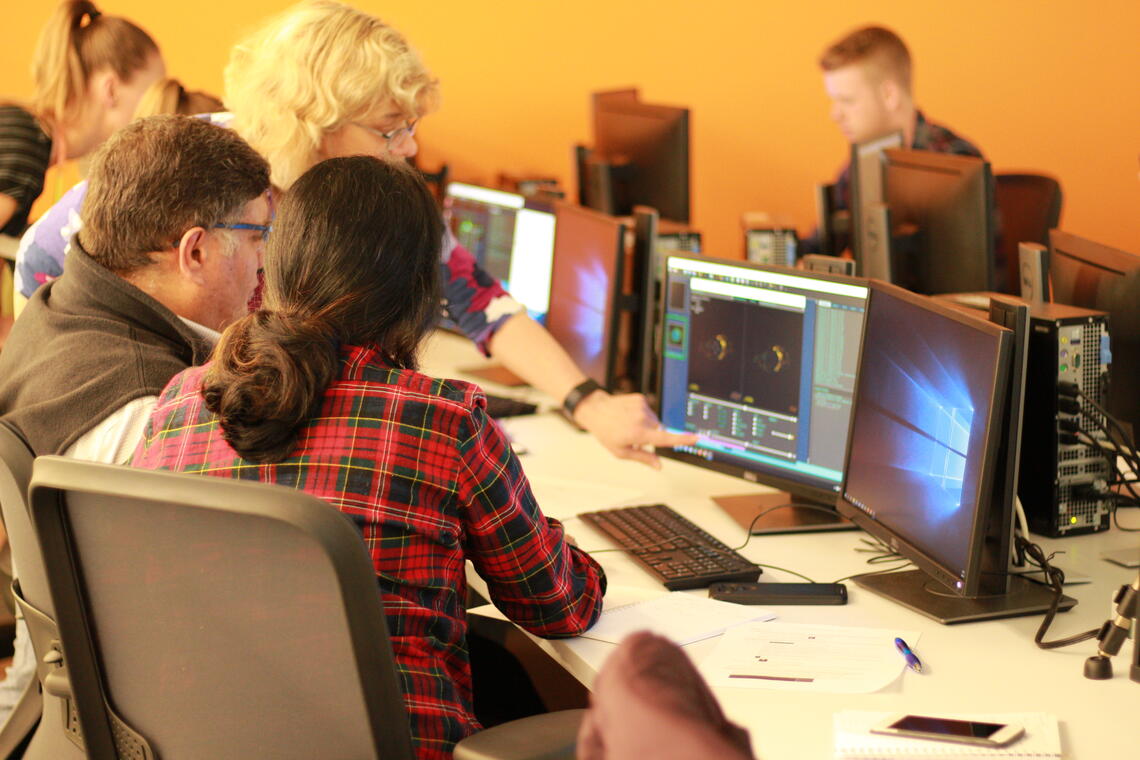
Quantitative Super-resolution Microscopy
The fascinating world of superresolution imaging
May 8-12, 2023

Workshop Overview
Students will join us for a workshop designed for active and personalized learning. This workshop is a unique opportunity to learn and group with other participants and facilitators across Canada. Our instructional delivery is informed by best practices in education research, ensuring a memorable and effective learning experience. As such, our workshop is unique because it blends live sessions with structured online pre‑work, making the learning more manageable, paced, and easier to absorb.
- High instructor to student ratio ensuring that participants receive individual attention and guidance
- Case study approach provided practical experience and real-world applications
- Hybrid delivery to ensure that attendees get the most of the onsite learning
Topics covered in this workshop
- Single molecule localization microscopy
- dSTORM
- DNA PAINT
- Particle tracking
- SRRF
- STED
- Organoid imaging
- One on one mentoring sessions with faculty and/or imaging personnel tailored to the individual and their imaging goals
- Best practices in sample preparation
- Tissue clearing
- Tissue expansion
- Fluidics and live-cell applications
- Data visualization and analysis
- Prototyping and 3D printing (optional)
Who should attend
This course is targeted to researchers who wanted to apply superresolution and related optical microscopy techniques to address their research questions. The workshop requires a working knowledge of fluorescence microscopy.
Registration Deadline: March 6, 2026
Course Fees: $1850
2023 Keynote speaker

Sarah Aufmkolk, PhD
Sarah Aufmkolk is a Research Associate at Harvard Medical School in the Department of Genetics. In the group of Ting Wu, she is focusing on advancing genomic imaging technologies for unraveling information hidden in the three-dimensional organization of chromatin. Her goal is to visualize the whole human genome in super-resolution, which she works on in collaboration with other laboratories in the context of the NIH-funded Center of Excellence in Genomic Science (CEGS). She is also working on the qualitative assessment of genomic SMLM studies and, in the context of the 4D Nucleome project, is working on platforms for open-source sharing of imaging data.
Sarah received her Diploma in Physics at the University of Wuerzburg in Germany, where she also completed her Ph.D. studies, titled “Super-resolution Microscopy of Synaptic Proteins”, in 2017 in the group of Markus Sauer, whose team pioneered the super-resolution technique of dSTORM.
In her postdoctoral research time at the Montreal Neurological Institute and the Chemistry Department of McGill in Montreal, she applied single-molecule localization techniques to investigate the peculiarities of structural changes in synaptic plasticity on the nanoscopic level introduced through development or neurodegenerative diseases. This venture led to the exploration of various fluorescence and label-free imaging techniques pushing for potential correlative imaging approaches with super-resolution microscopy. She continues this effort at Harvard Medical School, applying it to the field of genomics.
-
Instructors
Sarah Aufmkolk, PhD, Harvard University
Grace Baruta, PhD, University of Calgary
Anthony Bilodeau, Université Laval
Andrew Boyce, PhD, University of Calgary
Craig Brideau, PhD, University of Calgary
Claire Brown, PhD, McGill University
Pina Colarusso, PhD, University of Calgary
Vincent Ebacher, PhD, University of Calgary
David Elliott, PhD, University of Calgary
Guang Gao, PhD, University of British Columbia
Grant Gordon, PhD, University of Calgary
Bryan Heit, PhD, University of Western Ontario
Han Huang, University of Alberta
James Jonkman, University of Toronto
Flavie Lavoie-Cardinal, PhD, Université Laval
Sabine Mai, PhD, University of Manitoba
Jeffrey Mewburn, Queens University
Robert Nabi, PhD, University of British Columbia
Kamala Patel, PhD, University of Calgary
Ian Percel, PhD, University of Calgary
Björn Petri, PhD, University of Calgary
Nicholas Pittner, University of Calgary
Kelvin Poon, PhD, University of Calgary
Timothy Shutt, PhD, University of Calgary
Thomas Stroh, PhD, McGill University
Xuejun Sun, PhD, University of Alberta
Lucy Swift, PhD, University of Calgary
Nicolas Touret, PhD, University of Alberta
Chloë van Oostende-Triplet, PhD, University of Ottawa
Timothy Wong, University of British Columbia
Bronwen Parry, Industrial Partner Liaison
Mitra Shial, Community Outreach Liaison
